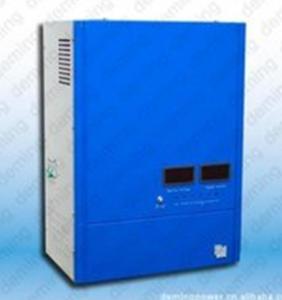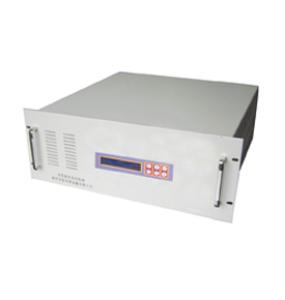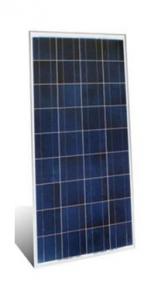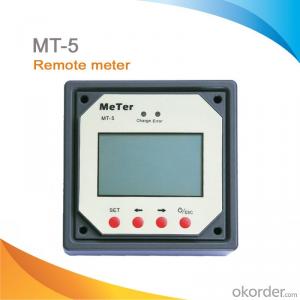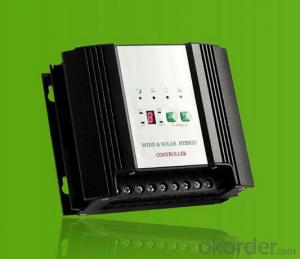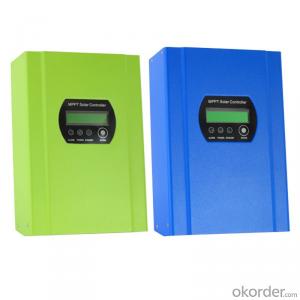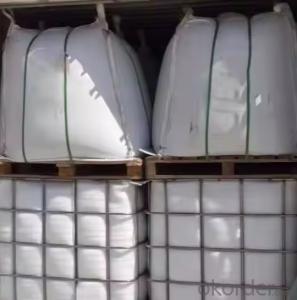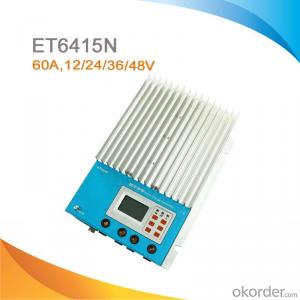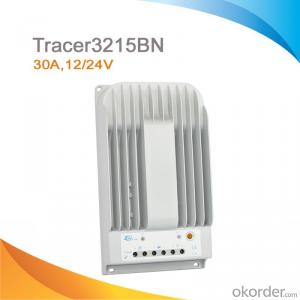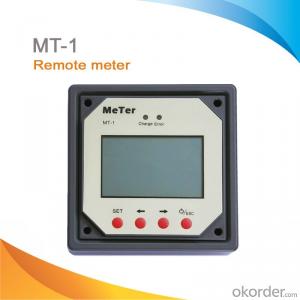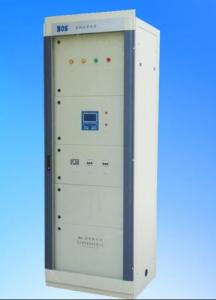PV Controller GS-30PDL4-R In a Competitive Price
OKorder Service Pledge
OKorder Financial Service
You Might Also Like
Description:
CNBMSOLAR is a world-leading and Vertical integrated manufacturer of high-performance with Silicon,
Wafer, Cells, Modules, which convert sunlight into electricity for residential, commercial, and utility-scale
power generation.
The capacity of CNBMSOLAR is reach to 1GW, and make sure each year our shipment capacity is more
Than 700-800MWs, at the same time, we have set up the largest solar power station with our partner
in Ukraine.
CNBM is a Quality + Service oriented company with“Excellence at Each Step” approach, composed of
the finest components from TUV and IEC-certified partners around the world, CNBM modules consistently
undergo a variety of trials at the company’s Test & Development Centre, ensuring peak performance
capabilities. The company is committed to develop and provide the world with clean and renewable energy
to ease the energy shortages as well as human kind’s impact on the environment.
Data:
Model | GS-30PDL4-R | |
Rated voltage | 48Vdc | |
Allowed Max charging current | 30A | |
Max discharging current | 30A | |
Charging loop | 4 | |
Charging current of each array loop | 7.5A | |
Output loop | 1 | |
Max open-circuit voltage | 100Vdc | |
Over charge protecting voltage | 56.8Vdc | |
Voltage down | Between arrary and battery | ≤0.7Vdc |
Between battery and load | ≤0.1Vdc | |
Display | LCD | |
Showing | Battery voltage,load current,charging current | |
Lighting devices | Optional | |
Protecting function | Overcharge,over voltage, short circuit, reverse polarity,reverse discharging and so on | |
IP class | IP20 | |
Noise | ≤60(dB,1m) | |
Environment temperature(℃) | -20~+50℃ | |
Altitude | ≤3000m | |
Dimension | 350*483*177mm | |
Weight | 18kg | |
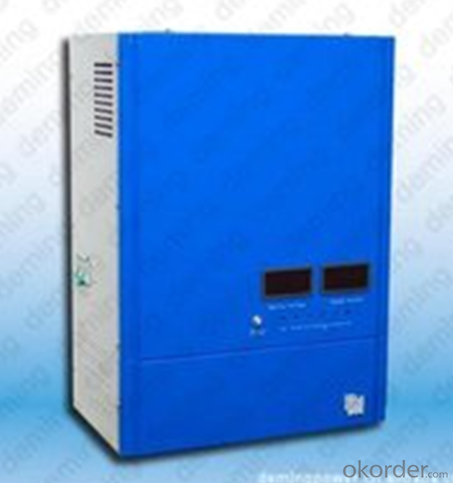
FAQ:Could you introduce more about CNBM?
CNBM Group is short for China National Building Materials Group Corporation, which is established in 1984 with approval from the State Council
CNBM Group is the largest comprehensive building materials industry group in China
The Group has a total asset of over RMB 360 billion, more than 180,000 employees and 17 subsidiaries
- Q:Some say that the inverter can not directly connected with the controller but the battery, but this inverter has not been in power consumption? If directly connected to the controller, the inverter 12 volts 2000 watts, the controller 12 volt 10 An certainly can not stand ah
- The controller combines the logic controller and the microprogram controller, both of which have strengths and weaknesses. The combination of logic controller design trouble, complex structure, once the design is completed, can not be modified or expanded, but it is fast. Microprogram controller is easy to design, simple structure, modify or expand are convenient, modify the function of a machine instruction, just repeat the corresponding micro-program; to add a machine instruction, just add a micro-program in the control memory, However, it is done by performing a short process. The specific comparison is as follows: Combination logic controller, also known as hard-wired controller, composed of logic circuit, completely by hardware to achieve the function of the instruction.
- Q:Can a solar controller be used with a battery backup system?
- Yes, a solar controller can be used with a battery backup system. The solar controller is responsible for regulating the charge from the solar panels to the batteries, ensuring optimal charging levels and protecting the batteries from overcharging. This is essential in a battery backup system as it allows the solar energy to be stored efficiently and used during times of power outage or when the solar panels are not producing enough electricity.
- Q:What is the maximum output voltage for a solar controller?
- The maximum output voltage for a solar controller typically depends on its design and specifications. However, in general, most solar controllers have a maximum output voltage of around 12 to 24 volts, which is commonly used for charging batteries in solar power systems.
- Q:Can a solar controller be used with solar-powered indoor hospitality facilities?
- Yes, a solar controller can be used with solar-powered indoor hospitality facilities. A solar controller is an essential component of a solar power system as it regulates the flow of electricity from the solar panels to the batteries. In the case of indoor hospitality facilities powered by solar energy, the solar controller would play a crucial role in managing the energy generated by the solar panels and ensuring it is efficiently stored in batteries for use during times when sunlight is not available, such as during nighttime or cloudy days. By using a solar controller, indoor hospitality facilities can effectively harness solar power and rely on it as a sustainable and renewable energy source to power their operations.
- Q:What is the role of a battery temperature sensor in a solar controller?
- The role of a battery temperature sensor in a solar controller is to monitor and regulate the temperature of the battery. This sensor ensures that the battery operates within its optimal temperature range, which helps to prolong its lifespan and improve its performance. Additionally, it helps prevent overheating or freezing conditions that could potentially damage the battery.
- Q:Can a solar controller be used with a solar-powered outdoor lighting system?
- Yes, a solar controller can be used with a solar-powered outdoor lighting system. The solar controller helps regulate the power flow from the solar panels to the lighting system, ensuring maximum efficiency and preventing overcharging or damage to the batteries.
- Q:How does a solar controller handle the protection against electromagnetic interference?
- A solar controller handles protection against electromagnetic interference by incorporating shielding mechanisms and filters to prevent unwanted electromagnetic signals from affecting its operation. These shielding mechanisms and filters help to block or reduce the impact of electromagnetic interference on the controller's circuitry, ensuring its proper functioning and minimizing any potential disruptions caused by external electromagnetic sources.
- Q:Can a solar controller be used with a solar water heating system?
- No, a solar controller is specifically designed to regulate the charging and discharging of batteries in a photovoltaic system. It is not suitable for use with a solar water heating system, which requires a different type of control system to regulate the flow and temperature of water in the system.
- Q:Can a solar controller be used with a solar-powered charging station for electric vehicles?
- Yes, a solar controller can be used with a solar-powered charging station for electric vehicles. A solar controller, also known as a charge controller, is an essential component in a solar power system that regulates the charging and discharging of the batteries. In the context of a solar-powered charging station for electric vehicles, the solar controller plays a crucial role in ensuring efficient and safe charging of the electric vehicle's batteries. The solar controller monitors the amount of energy being generated by the solar panels and regulates the charging process to prevent overcharging or undercharging of the batteries. It also protects the batteries from various electrical issues such as overvoltage, overcurrent, and short circuits. Additionally, some advanced solar controllers have features like maximum power point tracking (MPPT) which optimizes the charging efficiency by extracting maximum power from the solar panels. By using a solar controller in conjunction with a solar-powered charging station for electric vehicles, the charging process becomes more reliable and efficient. It ensures that the electric vehicle's batteries receive the appropriate amount of energy from the solar panels, maximizing the charging capacity and extending the battery life. Moreover, the solar controller provides an additional layer of protection for the batteries, safeguarding them against potential damage caused by irregularities in the solar power system. Overall, a solar controller is an essential component that enhances the performance, efficiency, and safety of a solar-powered charging station for electric vehicles. Its inclusion ensures proper charging regulation, protection, and optimization of the solar power system, thereby making it an integral part of the charging infrastructure for electric vehicles.
- Q:What is the role of a solar controller in maximizing solar panel efficiency?
- The role of a solar controller in maximizing solar panel efficiency is crucial in ensuring optimal performance and protection of the solar panel system. Solar controllers, also known as charge controllers or solar regulators, are responsible for regulating the flow of energy between the solar panels and the batteries or electrical loads. One of the main functions of a solar controller is to prevent overcharging of the batteries. As solar panels generate electricity, they continuously charge the batteries. However, if the batteries are overcharged, it can lead to damage and reduced lifespan. The solar controller monitors the battery voltage and ensures that the charging process is controlled and optimized, preventing overcharging and extending the battery life. Moreover, solar controllers also protect the batteries from deep discharge. When the batteries are not being charged, they can discharge power back into the solar panels, causing damage and reducing overall efficiency. The solar controller prevents this by disconnecting the solar panels from the batteries when the voltage drops below a certain threshold, preserving battery capacity and preventing damage. Additionally, solar controllers play a role in maximizing the efficiency of the solar panels by maximizing the power output. They employ Maximum Power Point Tracking (MPPT) technology, which allows the solar panels to operate at their maximum power output regardless of changes in temperature or shading. MPPT technology continuously adjusts the voltage and current to find the optimal operating point for the solar panels, ensuring that they are always producing the maximum amount of power possible. In summary, the role of a solar controller in maximizing solar panel efficiency is to regulate the flow of energy, prevent overcharging and deep discharge of batteries, and employ MPPT technology to optimize the power output of the solar panels. By performing these functions, solar controllers ensure that the solar panel system operates at its highest efficiency, maximizing the generation of clean, renewable energy.
1. Manufacturer Overview |
|
|---|---|
| Location | |
| Year Established | |
| Annual Output Value | |
| Main Markets | |
| Company Certifications | |
2. Manufacturer Certificates |
|
|---|---|
| a) Certification Name | |
| Range | |
| Reference | |
| Validity Period | |
3. Manufacturer Capability |
|
|---|---|
| a)Trade Capacity | |
| Nearest Port | |
| Export Percentage | |
| No.of Employees in Trade Department | |
| Language Spoken: | |
| b)Factory Information | |
| Factory Size: | |
| No. of Production Lines | |
| Contract Manufacturing | |
| Product Price Range | |
Send your message to us
PV Controller GS-30PDL4-R In a Competitive Price
OKorder Service Pledge
OKorder Financial Service
Similar products
New products
Hot products
Hot Searches
Related keywords
